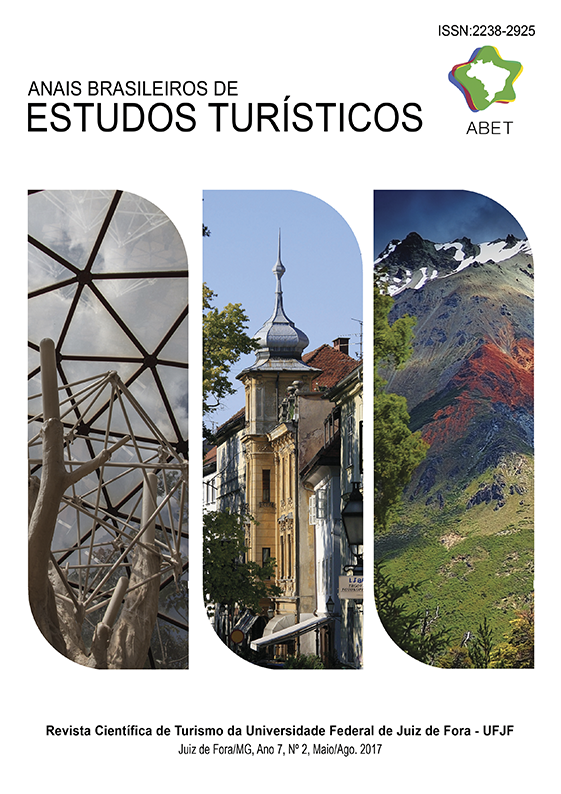Bourdieu, Tourism Field and its Implications for Governance of Tourist Destinations
DOI:
https://doi.org/10.34019/2238-2925.2017.v7.3180Keywords:
Bourdieu. Tourism field. Tourist destination. Collective action.Abstract
This theoretical essay aims to introduce the concept of field derivative from the Bourdeusian sociological theory to tourism and discuss some implications from it to governance of tourist destinations. For this it was done a brief review on Bourdieu’s sociological theory and in the scarce papers in tourism area that tried to approximate this theoretical framework and tourism phenomena. In the results we present a proposal of transposition to the concept of field to tourism. In the same way it is showed the different possibilities that the pattern of relationships of the actors can set it up. It is argued that the actors in a tourism field needs to, directly or not, consider and deal with the positions of the others actors in the field. In conclusion if one wants to obtain a broader and efficient system of governance to tourist destination is necessary to analyze how structured the field is, who are the actors, what are their positions and what are their dispositions to act in some way. These elements will provide a matrix of relations to guide an empirical destination to identify and manage more accurately its constraints and capabilities to develop.
Downloads
References
BOURDIEU, P. As regras da arte: gênese e estrutura do campo literário. [Trad. Maria Lúcia Machado]. São Paulo (SP): Companhia das Letras, 1996.
BOURDIEU, P. From the King's House to the Reason of State: A Model of the Genesis of the Bureaucratic Field. Constellations, 11: 16–36., 2004. Doi: 10.1111/j.1351-0487.2004.00359.x
BOURDIEU, P. Las Estructuras Sociales de la Economía. 1ª Ed. [1ª Reimp. 2002] Buenos Aires: Ediciones Manantial SRL. 271p. 2001.
BOURDIEU, P. Las formas del capital: capital econômico, capital cultural y capital social. In: Bourdieu, P. Poder, Derecho y Clases Sociales. 2 Ed. (Spanish Edition). Desclée de Brouwer: 2008. 236p. Cap.4, pp.131-164.
BUCKLEY, W. A Sociologia e a Moderna Teoria dos Sistemas. São Paulo: Editora Cultrix, 1971.
BUTLER, R. The Concept of a Tourist Area of Life Cycle of Evolution: Implications for Management of Resources. Canadian Geographer, 19 (1): 5-12, 1980.
CROZIER, M. ; FRIEDBERG, E. Organisations et action collective. In: CROZIER, M. A quoi sert la sociologie des organisations? Paris: Éditions Seli Arslan, 1995.
DIECKOW, L. M. Turismo. Un abordaje micro y macro económico. (Edición electrónica gratuita), 2010. From: <http.www.eumed.net/libros/2010b/678/>. Access: 22 abril 2012.
DYE, T. Understanding public policy. (13th Edition). New York: Longman Press, 2009.
ESCALONA, F. M. Una Función Ignorada: la de producción de turismo (Segundo Memorial de Agravios). Revista Tursimo y desenvolvimento (TURyDES), 3 (7), 1-24, 2010.
HIRSCHMAN, A. O. Exit, Voice, and Loyalty: Responses to Decline in Firms, Organizations, and States. Cambridge, MA: Harvard University Press, 1970.
HOERNER, J-M.; SICART, C. S. La science du tourisme: précis franco-angais de tourismologie. (Edition bilingue, collection «Homo Turisticus»). Paris: Balzac Press, 2001.
JENKINS, R. Pierre Bourdieu: key sociologists. New York (USA): Routledge /Taylor & Francis e-Library, 2006 [1992]. (Series: The Open University). 137p.
KINGDON, J. Agendas, Alternatives, and Public Policies. Boston: Little, Brown Press, 1998.
KUHN, T. S. The structure of scientific revolutions. Chicago: University of Chicago, 1962. 172p.
PIMENTEL, M. P. C. A Institucionalização de Políticas Públicas de Turismo em Âmbito Municipal no Brasil. Unpublished master dissertation (Business Management), Federal University of Lavras, Lavras (MG), 2011.
PIMENTEL, T. D. Space, Identity and Power: outline of a morphogenetic and morfostatic theory to the sociology of organizations. 471f. Thesis (Ph.D.) – Institute of Human Sciences, Federal University of Juiz de Fora, Juiz de Fora (MG), 2012.
THIRY-CHERQUES, H. R. Pierre Bourdieu: a teoria na prática. Revista de Administração Pública - RAP, Rio de Janeiro (RJ), 40 (1): 27-55, Jan./Fev, 2006.
VANDENBERGHE, F. Teoria Social Realista: um diálogo franco-britânico. Belo Horizonte: UFMG Press, 2010.
VANDENBERGHE, F. A era dos epígonos: a teoria social pós-bourdieusiana na França. In: VANDENBERGHE, F. Teoria Social Realista: um diálogo franco-britânico. Belo Horizonte (MG): Editora UFMG/ Rio de Janeiro (RJ): IUPERJ, 2010c. pp.85-110.
VANDENBERGHE, F. O esgotamento do novo movimento teórico e a era dos epígonos. In: Invenção do Contemporâneo, 2009, Campinas. CPFL. Palestra publicada em vídeo em: 09/10/2009 às 22:45:05. From: http://www.cpflcultura.com.br/site/2009/11/30/integra-o-esgotamento-do-%E2%80%9Cnovo-movimento-teorico%E2%80%9D-e-a-era-de-epigonos-frederic-vandenberghe/. Access: 25 ago 2011.
Downloads
Published
How to Cite
Issue
Section
License
This journal provides immediate open access to its content, following the principle that providing free scientific knowledge to the public provides greater democratization of world knowledge.
Authors must agree to the following terms relating to copyrights:
(a) Authors keep all copyright and grant the to the journal the right of first publication, with the work simultaneously licensed under the Creative Commons Attribution License that allowing job sharing with recognition of authorship of the work and initial publication in this journal.
(b) Authors are allowed to assume additional contracts separately, for non-exclusive distribution of the version of the work published in this journal (e.g. publish in institutional repository or book chapter), with recognition of authorship and initial publication in this magazine.
(c) Authors are allowed and are encouraged to publish and distribute their work online (e.g. in institutional repositories or on your personal page) since they do not do this before or during the editorial process, as this can generate productive interchange, as well as increase the impact and citation of work aired. (See Effect of Free Access).















